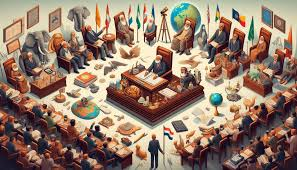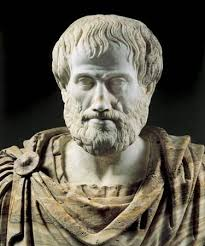Q. How is Political thought distinguished from political theory and political philosophy? Explain.
Political Thought, Political Theory, and Political
Philosophy: A Comprehensive Distinction
Political
thought, political theory, and political philosophy are all branches of
political science that explore the nature, distribution, and exercise of power
in human societies. While these terms are often used interchangeably, they
refer to different aspects of the intellectual tradition concerned with
politics. Understanding the distinctions between these concepts is crucial for
both scholars and students of political science. This discussion will break
down each of these terms in detail, explaining their origins, key
characteristics, and differences.
1. Political Thought: An Overview
Political
thought refers to the historical
development of ideas and concepts about politics, power, governance, and
authority. It is the study of how political ideas have evolved over time and
how these ideas have been applied in different political contexts. Political thought
is rooted in the intellectual traditions of history, examining how individuals,
communities, and societies have conceptualized political structures, justice,
and the role of the state.
- Historical Dimension: Political thought focuses on the writings of political
thinkers throughout history. It includes the analysis of classical works
such as Plato’s Republic, Aristotle’s Politics,
Machiavelli’s The Prince, Hobbes’ Leviathan, Locke’s Second
Treatise of Government, Rousseau’s The Social Contract, Marx’s Das
Kapital, and others. These texts provide insights into how political
ideas have evolved in response to changing social, economic, and
historical circumstances.
- Development of Ideas: The emphasis in political thought is on how political
ideas develop and the contexts in which these ideas emerge. For example,
the shift from feudalism to the early modern state is reflected in the
works of political thinkers like Machiavelli and Hobbes. Political thought
explores how ideas about the nature of authority, individual rights,
liberty, equality, and justice have been shaped by the particular
historical conditions of their time.
- Practical Focus: Political thought is also concerned with the
practical applications of political ideas. It is more focused on
historical case studies and the ways in which political thinkers and
movements have shaped political institutions and practices. In this sense,
political thought is rooted in real-world politics and seeks to
understand the influence of political ideas on the organization of
societies and governance.
- Case Study Approach: Political thought often analyzes specific periods in
history to understand the political mindset of a time. For instance, the
Renaissance and the Enlightenment were periods of dramatic shifts in
political ideas, which were influenced by the conditions of those times,
such as the rise of secularism, the expansion of trade, and the challenges
to absolutist monarchies.
In
essence, political thought is a historical discipline that examines the
development of political ideas and practices across time, offering a lens
through which to understand how past political contexts and ideologies have
shaped the present.
2. Political Theory: An Overview
Political
theory, by contrast, is a more systematic
and analytical study of the concepts and principles that underlie political
systems. It is concerned with the study of political ideas in a theoretical and
normative manner. While political thought focuses on the historical development
of political ideas, political theory tends to be more abstract, focusing on the
analysis and critique of political concepts.
- Conceptual Analysis: Political theory is primarily concerned with the
systematic analysis of concepts such as justice, freedom, equality,
democracy, and power. Political theorists seek to define
these concepts, identify their implications, and assess their relevance to
contemporary political systems. For example, political theorists might
ask, “What does democracy truly mean?” or “What are the implications of
freedom in a society?”
- Normative Focus: Political theory is often normative, meaning it deals
with the principles and values that ought to govern political life. It
explores how societies should be organized and what values should guide
political action. For example, political theory might explore the ideal
form of government, the proper distribution of wealth, or the rights of
individuals in a society. It is concerned not just with what is,
but with what ought to be.
- Theoretical Models: Political theory also develops models and frameworks
for understanding political systems and governance. These models are often
built on abstract concepts that serve as theoretical foundations for
understanding political realities. For instance, political theorists have
developed democratic models such as participatory democracy, representative
democracy, and deliberative democracy, each of which offers a
different approach to the role of citizens in governance.
- Contemporary Relevance: Unlike political thought, which is largely concerned
with the study of historical figures and texts, political theory is
concerned with both contemporary issues and the application of theoretical
principles to modern political problems. Political theorists engage with
current issues, such as climate change, global inequality, migration,
and human rights, and seek to provide a theoretical framework for
addressing these challenges.
- Philosophical Engagement: Political theory engages with broader philosophical
issues, such as ethics, epistemology, and metaphysics. Political theorists
often draw on philosophy to examine the ethical implications of political
action and the nature of human agency. For example, a political theorist
might use Rawls’ Theory of Justice to discuss how a fair
distribution of resources could be achieved in a modern society.
Political
theory thus serves as the critical and analytic study of political concepts,
principles, and institutions, offering a framework for evaluating and
understanding political systems.
3. Political Philosophy: An Overview
Political
philosophy, while closely related to political
theory, has a deeper and more foundational connection to the realm of
philosophy. Political philosophy is concerned with the moral and ethical
foundations of political systems and ideas. It deals with the fundamental
questions about justice, morality, human nature, and the
state. Unlike political theory, which tends to be more abstract and
systematic, political philosophy often explores the deep, foundational
questions about the nature of political authority, legitimacy, and ethical
political action.
- Ethical and Moral Foundations: Political philosophy examines the moral and ethical
basis for political authority and governance. For example, the writings of
Plato and Aristotle laid the foundation for political
philosophy by exploring the nature of the just society and the moral
responsibilities of rulers. Political philosophers seek to understand the
ethical principles that justify political power and the role of the state
in ensuring justice.
- Theoretical vs. Practical
Concerns: While political theory is
often more concerned with practical, normative questions (e.g., how
democracy should function or what policies should be implemented),
political philosophy delves into more abstract and theoretical questions.
For instance, it asks questions like: “What is the best form of
government?” “What makes a political system just?” “What are the rights
and duties of individuals in a society?” and “What is the relationship
between freedom and authority?”
- Philosophical Inquiry: Political philosophy employs broader philosophical
methodologies to examine political issues. It engages with questions in ethics,
metaphysics, and epistemology. It seeks to understand the
nature of human beings and their relationship with political
structures. Political philosophers like John Locke, Jean-Jacques
Rousseau, and Karl Marx provide not just theoretical models but
also normative visions of how political systems should be constructed
based on their philosophical understanding of human nature and society.
- Justice and Morality: A central concern of political philosophy is justice—what
constitutes a just society and how it can be achieved. Philosophers like John
Rawls in his Theory of Justice and Robert Nozick in Anarchy,
State, and Utopia engage with the concept of justice in relation to
political structures, individual rights, and societal needs. Political
philosophy also grapples with moral issues like equality, liberty,
and autonomy, trying to reconcile competing values in a coherent
political system.
- Fundamental Political Problems: Political philosophy often addresses the most
fundamental problems of politics, such as the legitimacy of political
authority, the nature of sovereignty, the justification of coercion and
punishment, and the problem of political obligation. For example, Hobbes'
Leviathan addresses the necessity of a sovereign authority to prevent
chaos, while Rousseau’s Social Contract explores the idea of a
democratic collective will as the legitimate basis for political
authority.
- Philosophical Traditions: Political philosophy has deep roots in the history of
Western philosophy, but it is also influenced by other philosophical
traditions, including Eastern philosophy and Islamic political
thought. Each tradition provides distinct answers to questions of
governance, justice, and political legitimacy. For instance, the Confucian
tradition emphasizes the moral duty of rulers to act justly, while Islamic
political thought, particularly in the works of Al-Farabi and Ibn
Khaldun, has its own set of principles regarding governance and
justice.
4. Key Differences Between Political Thought, Political
Theory, and Political Philosophy
- Focus: Political thought is primarily historical, focusing
on the development of political ideas and their historical contexts.
Political theory, on the other hand, is systematic and analytical,
focusing on political concepts and their contemporary application.
Political philosophy engages with foundational questions about ethics,
justice, and the nature of politics, and it often aims to uncover the
moral and philosophical justifications for political structures and
systems.
- Methodology: Political thought utilizes historical analysis to
study the evolution of political ideas. Political theory employs logical
reasoning and conceptual analysis to examine political ideas. Political
philosophy often engages with normative ethical theories and broader
philosophical methods to address the moral dimensions of political
authority and governance.
- Practical vs. Theoretical: Political theory is more concerned with practical
political systems and their implications, whereas political philosophy
focuses on abstract, moral, and ethical questions. Political thought lies
somewhere in between, as it provides historical context for understanding
how political systems and ideas evolved over time.
Conclusion
In
conclusion, while political thought, political theory, and political
philosophy are closely related disciplines, they differ in their focus,
methodology, and scope. Political thought is concerned with the historical
development of political ideas and their contextual applications. Political theory,
on the other hand, is focused on the analysis of political concepts and their
contemporary significance, often in normative terms. Political philosophy seeks
to explore the fundamental ethical and moral issues related to political
authority, justice, and governance, addressing the foundational questions that
underlie political systems.
Understanding
these distinctions helps clarify how political scientists, historians, and
philosophers approach the study of politics from different angles, providing a deeper
insight into the complexities of political systems and the ideas that shape
them.









0 comments:
Note: Only a member of this blog may post a comment.